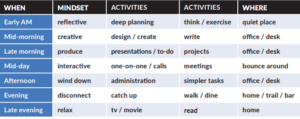Think Business — How Productive Are You?
Do you know anyone who refers to themselves as a “morning person?” How about someone who says, “I’m a night owl?”
Morning people get out of bed energized and ready to rock, while night owls like to ease into the day or even sleep in as much as they can and get more productive later in the day.
We all have internal rhythms that affect our focus and energy levels. These fluctuations can make us sharper at certain times, and foggier at others. These inner clocks vary greatly from person to person, and are also influenced by age, which is why teenagers are famous for staying up late and sleeping until noon.
When I wrote the book “Control Your Day Before It Controls You: The 7 Steps to Mastering Your Time,” (Advantage Media Group, 2017), I began to study this subject more proactively and personally. I discovered that (for me) writing a book requires a daily commitment to be effective. I found that sitting down between 8:30 a.m. and 10 a.m. was my sweet spot.
If I wrote for more than 90 minutes in one session, I would begin to mentally shut down and my creativity level would begin to drop off. If I tried to write in the afternoon I would get distracted. Not only was the morning most productive for me, but I was also able to truly enjoy the process of writing the book during those hours.
After this experience, I began to drill deeper into my different mindsets and the ideal activities for me at varying times of day. I found that early morning was a reflective or meditative time. I would naturally spend those hours quietly planning or thinking. On the other hand, late afternoon I wanted to do more mundane administrative or reduced thinking activities.
Needless to say, we all don’t have 100 percent freedom to design our day; however, here are five tips that can help make this come to life.

- Take inventory of your own internal rhythms.
- Plan your week with the chart (above) in mind.
- If there is a conflict — meaning you’re doing an activity when it is not ideal — try asking others to do that activity or have that meeting when you are at your best. (You might be surprised that people will tend to accommodate your desire, especially if they know why.)
- Observe your effectiveness and stress levels. Is it better or worse?
- Begin to move more medium and long-term interests and goals into the time slots where you are most effective.
You are not going to bat 1,000 percent. But if these methods increase your effectiveness by even 10 percent, you will not only accomplish more but also feel more fulfilled.








 Video Library
Video Library 

















